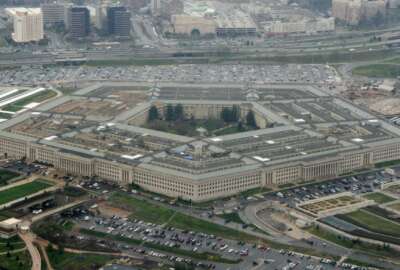
Federal, state, and local governments begin preparations for workers to return to the office
In today's Federal Newscast, agencies are starting to make some initial preparations for employees to return to the office.
To listen to the Federal Newscast on your phone or mobile device, subscribe in PodcastOne or Apple Podcasts. The best listening experience on desktop can be found using Chrome, Firefox or Safari.
- Agencies are starting to make some initial preparations for employees to return to the office. Federal, state and local governments asked the General Services Administration to help identify companies that could provide Enhanced Entry Screening Services at government facilities. GSA conducted the market research and found more than 60 federal supply schedule contractors who could provide these services. The agency also provided vendor data and capability statements as well as a sample request for quote.
- OMB gives agencies much needed guidance about whether or not to pay contractors during the pandemic. The Office of Management and Budget weighed in on the section of the stimulus bill telling agencies to keep vendors in a state of ready. The administration’s new memo outlines important considerations when deciding if contractors are able to receive payment if they can’t work because of the coronavirus emergency. The law’s provision, 3610, gives agencies considerable discretion to treat paid leave as a reimbursable cost. OMB says agencies can consider reimbursement for any lost time starting on March 27. The OMB memo comes after DoD and ODNI released similar guidance last week.
- One federal agency has recycled guidance from an earlier virus outbreak, reissuing it for coronavirus. The Equal Employment Opportunity Commission re-publishes advice on pandemic preparedness and dealing with disabilities, from the H1N1 outbreak in October 2009. EEOC says it’s still relevant today. Still the commission added some updates. Basically it reiterates that people with disabilities don’t lose their rights … and that they can be excluded from the workplace only if they pose a direct threat. And it allows employers to screen disabled applicants for COVID-19, and take their temperature before they actually report.
- Over 50 local union leaders representing employees at Customs and Border Protection’s Office of Field Operations are calling on CBP to reinstate weather and safety leave schedules. CBP says it canceled weather and safety leave schedules so its officers could prepare for the potential influx of migrants with coronavirus. But local leaders at the National Treasury Employees Union say traffic is down at the ports of entry. Some union leaders have been arranging for their employees to receive COVID-19 testing off-site. At least 246 CBP employees have tested positive for coronavirus across the agency. (Federal News Network)
- The Occupational Safety and Health Administration says it will investigate complaints about the working conditions at Veterans Affairs medical facilities. The American Federation of Government Employees issued a complaint last week. It accused VA of failing to provide adequate personal protective equipment to VA medical professionals. AFGE also filed a national grievance with VA over its handling of the Disaster Emergency Medical Personnel System. DEMPS allows VA employees to volunteer for deployments to high risk areas. But AFGE says some facilities have been mandating enrollment.
- VA is working directly with the IRS to share direct deposit information for veterans to get their stimulus checks automatically. VA and Treasury say veterans who receive compensation and pension benefit payments do not need to take action to receive their stimulus checks. There will be no processing interruption for veterans who did enter their direct deposit information on the IRS payment portal. VA says it’s unclear when veterans can expect to receive these stimulus checks.
- The Pentagon is extending travel restrictions for its personnel through the end of June. Defense Sec. Mark Esper is expected to sign the order today. The current stop-movement orders, implemented last month, were set to expire on May 11, but Esper had already signaled that he expected to extend them. Defense officials say even though the newest order will be in place for longer, it will allow for more exceptions. DoD expects to take a more liberal approach to allowing for overseas deployments and redeployments, but leave travel will still be highly-restricted. (Federal News Network)
- The Navy is trying to keep its acquisition programs as much on schedule as possible during the coronavirus outbreak. Navy acquisition chief James Geurts says the service is awarding contracts earlier and injecting cash into businesses to keep the industrial base afloat. The Navy is also taking stock of what issues COVID-19 is causing to the procurement of major weapons systems so they can be sorted out once the crisis is over. (Federal News Network)
- The Air Force needs to better its plan for the Advanced Battle Management System, according to a new report from the Government Accountability Office. The program connects weapons systems in real-time to take advantage of artificial intelligence and other technologies. GAO says the battle management system is missing key pieces in its business case like firm requirements, cost estimates and affordability analysis. GAO says the Air Force should formalized the structure and decision-making authorities around the program.
- Households that haven’t filled out the 2020 Census yet will get a paper questionnaire and a reminder in the mail through the end of this month. Households will also get a postcard reminder between April 27 and May 9. The Census Bureau pushed back its timeline on these two mailings because of social distancing practices during the pandemic. Meanwhile, the Trump administration has called on Congress to push the end date for the 2020 count back to April 2021.
- NASA took the next step with robotic process automation. Three years into NASA’s RPA pilot, its shared services center is working with its credentialing office to field six unattended bots that do testing and development. Pam Wolfe, the chief of NASA’s Enterprise Services Division, says automation has played a key role in an agencywide mission realignment that’s looked at ways to rethink the future of all its major lines of business. Wolfe says NASA is also training employees on bot development, and that she now has eight developers on her team.
Copyright © 2024 Federal News Network. All rights reserved. This website is not intended for users located within the European Economic Area.
Eric White
Eric White is news anchor and Federal Drive producer at Federal News Network.
Follow @FEDERALNEWSCAST
Related Stories
Related Topics
2020 Census
advanced battle management system
All News
Census Bureau
Covid-19
Customs and Border Protection
Equal Employment Opportunity Commission
Federal Drive
Federal Newscast
General Services Administration
Government Accountability Office
IRS
Management
Mark Esper
NASA
Occupational Safety and Health Administration
Office of Management and Budget
Pam Wolfe
robotic process automation
Treasury Department
Workforce





